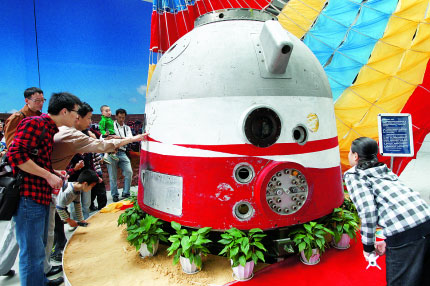5th manned space trip for next year
 0 Comment(s)
0 Comment(s) Print
Print E-mail Shanghai Daily, October 28, 2012
E-mail Shanghai Daily, October 28, 2012
|
|
|
Visitors take a close look at the re-entry capsule of the Shenzhou-4 spaceship. [Shanghai Daily] |
China's fifth manned space mission will lift off next year, Yang Liwei, China's first "taikonaut" - China's terms for its astronauts - and deputy director of the country's manned space program has confirmed.
The exact date of the launch will be decided after a full assessment of previous missions by spacecraft Shenzhou-8 and Shenzhou-9.
Yang said the Shenzhou-10 manned spacecraft will carry three taikonauts into space, and that the crew will include veterans and perhaps women. "It is possible that female astronauts will be on board," he added. The candidates will be decided early next year.
This year Liu Yang became China's first female taikonaut. Together with Jing Haipeng and Liu Wang, she went into space aboard Shenzhou-9 on June 16 and conducted a series of scientific tests during the 13-day mission that was hailed as a great success.
Next year's space mission mainly aims to consolidate and improve docking techniques, conduct more scientific experiments and solve problems discovered in the previous missions, said Yang.
"One success doesn't mean success every time," he told a news conference in Shanghai. "We would like to have more practice and improve the quality," Yang explained.
Yang was in town for the opening of an aerospace and aviation exhibition marking the 20-year anniversary of the launch of China's manned space program.
At the event, Yang also revealed that the Shenzhou-10 mission will adjust the working schedule and routine of taikonauts, laying the foundation for building a space station. China plans to build its first in 2020.
Technical breakthroughs
"Once established, the space station will provide a national-level platform for scientific research in outer space," Yang added. "So the next mission will also focus on technical breakthroughs in environmental control and life support systems."
After the Shenzhou-10 space mission, China is scheduled to launch the Tiangong-2 space lab module to research supply transport by cargo spaceships, another milestone for China's space program.
"Space travel won't be a problem for China in the future," Yang said.
The aviation exhibition, featuring 150 photographs, documents and other objects, is being held at Qian Xuesen Library and Museum of Shanghai Jiao Tong University. One of the highlights is the re-entry capsule of the Shenzhou-4 spaceship. The exhibition runs through December 26.







Go to Forum >>0 Comment(s)